Stay in the know on all smart updates of your favorite topics.
Demoday #28: Designing for Circularity in the Port of Amsterdam
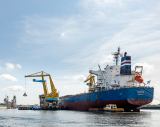
During Demoday #28, we focused on one of the key challenges in the circular transition: how can we make the Port of Amsterdam fully circular?
The Amsterdam port is one of the largest in Europe. It functions as a major energy hub, where fossil fuels still play a central role, and as an industrial hub, where massive flows of raw materials pass through. The City of Amsterdam has set the ambitious goal of becoming fully circular by 2050. This means the port must transform as well. This is a complex and far-reaching task that requires collaboration and innovation.
In this work session, we zoomed in on circular design: how can we make products and processes circular from start to finish?
A closer look at the port
James Hallworth, Commercial Manager at Port of Amsterdam, opened the session by taking the group on a tour through the world of the port. Located in the western harbour area, the port has two main responsibilities. First, it ensures the smooth and safe handling of all maritime traffic on behalf of the City of Amsterdam. Second, it manages and develops the land and industrial areas around the harbour.
To tackle circularity, Port of Amsterdam applies industrial ecosystem thinking. In nature, waste does not exist, and the same principle should apply here. The port aims to build collaborative networks between companies, where waste flows from one company becomes raw materials for another. There is already significant activity around recycling and recovery, but more can be done in higher-value strategies on the R-ladder, such as repurposing, remanufacturing, and refurbishment. Circular by design is a key concept in this shift.
The port is transitioning from measuring success in tons to measuring added value. This shift also means thinking differently about space: circular systems require space to receive, process, and recover valuable materials from waste streams.
Getting hands-on with circular design
Creating a fully circular production process is easier said than done. That’s why we worked through two real-world cases: construction materials and e-bikes. Participants split into groups and explored what a truly circular production process might look like. We also explored the potential role the port could play as an enabler of circular supply chains.
Some key takeaways from the session:
• Material passports: A digital document containing material properties and origin can greatly simplify recycling and reuse.
• Monomaterials: Products made from a single type of material are much easier to separate and recycle at the end of life.
• Smart synergies: Mapping which companies can use each other’s waste flows as input can unlock huge circular potential.
• Financial incentives: Right now, circular processes are often more expensive than linear ones. Smart financial mechanisms could help bridge that gap.
• E-bike challenges: In the case of e-bikes, batteries were flagged as a challenge. Recycling them is still very difficult, and since they are mostly produced outside of Europe, it’s hard to have control over the production process.
This session invited participants to take a step back and view products through a circular lens. The port has the potential to become a key player in the circular transition, but to get there, it will need ideas, insights, and input from across the network.
<strong>Do you have ideas on how the Port of Amsterdam can become more circular? Or would you like to contribute to future sessions? Get in touch with Noor at noor@amsterdaminchange.com. A big thank you to James Hallworth from Port of Amsterdam for bringing this challenge to the network, and Yanti Slaats (Amsterdam University of Applied Sciences) for moderating the session.</strong>
Buurttuinen redden samen ruim 25.000 kilo groente- en fruitafval
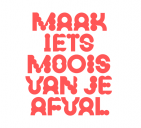
Dankzij de inspanningen van organisatie Afval naar Oogst en honderden vrijwilligers hebben vijftien buurttuinen dit jaar al meer dan 25.000 kilo groente- en fruitafval van de vuilnisbak kunnen redden. Dit resultaat wordt gevierd op 28 september tijdens het Afval naar Oogstfeest. Ook openen er dan elf nieuwe inleverpunten waar Amsterdammers zich kunnen aanmelden om hun gf-afval in te leveren.
Van Afval naar Oogst
Maar liefst een derde van de vuilniszak van Amsterdammers bestaat uit groente-, fruit- en tuinafval, dat nu in de verbrandingsoven belandt. Zonde! Deze keukenresten kunnen we omzetten in een waardevolle grondstof: compost.
Afval naar Oogst maakt het voor Amsterdammers mogelijk om hun schillen en klokhuizen in te leveren bij buurttuinen en stadsboerderijen. De organisatie begeleidt vrijwilligers bij het maken van hoogwaardige compost, die zij weer gebruiken om de tuinen te voeden. Daardoor kunnen er opnieuw groenten, kruiden, fruit en bloemen groeien. Van afval naar oogst dus!
Wist je dat de tuin elk jaar compost nodig heeft om de bodem en dus de planten gezond te houden?
Laagdrempelig en lokaal
Afval naar Oogst begon met één locatie in Amsterdam-West en is inmiddels uitgegroeid tot 22 plekken verspreid over de stad. Tijdens het Afval naar Oogstfeest kunnen bezoekers daar onder andere uitleg krijgen over composteren én zich aanmelden als groente- en fruitafval donateur.
Deelnemer van het GWL-terrein in West: “Ik ben zo blij dat ik in mijn buurt makkelijk een duurzame bijdrage kan leveren. Hier was ik jaren naar op zoek.”
Mooi programma
Tijdens het Afval naar Oogstfeest kun je ook ontdekken wat je nog meer met keukenafval kunt doen. Doe bijvoorbeeld mee aan een workshop verf maken met groenteschillen. Of verdiep je in de wonderlijke wereld van de bodem. In Amsterdam-West kun je meedoen aan een speciale Afval naar Oogst fietsroute! Meer informatie over het programma en de deelnemende locaties vind je op de website of sociale media van Afval naar Oogst. Aanmelden is niet nodig.
Afval naar Oogst slaat aan
Honderden stadsbewoners leveren inmiddels hun groente- en fruitafval in. Ook de gemeente Amsterdam is enthousiast. De stad wil in 2030 zeker 75% van het gft-afval hergebruiken. Afval naar Oogst helpt daarbij door bewustwording te vergroten. Initiatiefnemer Natascha Hagenbeek: “In onze tuinen kunnen Amsterdammers de kringloop zien en ervaren. Compost maken van ‘afval’ is al een prachtig proces. Er vervolgens groente en fruit uit te zien groeien, is betoverend.”
Recycling start-up Droppie has announced their first recycling hub in Amsterdam

Droppie, the innovative recycling start-up, is gearing up to open its first recycling hub in Amsterdam starting June 2024.
At Droppie, we're on a mission to make the world a cleaner place by adding value to recyclables. We've developed a unique collection system and a handy mobile app that rewards users for responsibly recycling all sorts of materials, from textiles to plastics to e-waste!
Bag it. Drop it. Cash it.
Stay tuned for more updates as we countdown to our official launch. Get ready to join us on this exciting journey as we continue to innovate, grow, and make a difference together!
Open evenementen voor het testen van innovatie [Innovation wanted!]
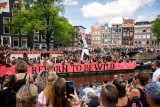
Evenementen in de stad willen we verder verduurzamen en toegankelijker maken. Vaak vinden evenementen plaats op centrale plekken waar mensen bij elkaar komen en waar veel afval, drinkwater en consumptievoorzieningen zijn. Dit zijn goede plekken om nieuwe innovaties te testen en verder te ontwikkelen. Tot 29 februari kunnen ondernemers zich inschrijven om hun innovatie te testen via het In Residence programma Open Evenementen.
In Residence programma
Innovatieve ondernemers kunnen zich inschrijven voor het In Residence programma van het stedelijk innovatieteam, waarin open evenementen in Amsterdam worden ingezet voor het testen van innovaties. Het doel van dit programma is om kennis te ontwikkelen voor zowel het verduurzamen van evenementen, als voor het vinden van praktische oplossingen voor een toekomstbestendige stad.
Geselecteerde ondernemers krijgen daarbij professionele begeleiding bij het verder ontwikkelen van hun innovatie en de mogelijkheid samen te werken met ambtenaren en evenementenorganisatoren. Voor het testen van hun innovatie krijgen ondernemers een budget tot €15.000,- toegewezen. Het programma duurt 6 maanden, van mei tot en met oktober 2024. Op 26 april worden de 8 ondernemers bekend gemaakt die dit jaar aan het programma mee zullen doen.
Het In Residence programma Open Evenementen vindt plaats in aanloop naar het jubileumjaar 2025 – het jaar van Amsterdam 750 en SAIL – dat groots gevierd zal worden in de hele stad. Innovaties die de komende tijd op evenementen worden getest en door ontwikkeld kunnen mogelijk een rol hebben tijdens de grootschalige evenementen die dat jaar plaatsvinden.
Evenementen als proeftuin
Meerdere grote evenementen nemen deel aan het programma. De organisaties van onder andere Pride en de Marathon bieden geselecteerde ondernemers mogelijkheden om innovaties op thema’s als duurzaamheid, circulair, mobiliteit, inclusie en toegankelijkheid te testen tijdens deze evenementen. Kansrijke innovaties krijgen hierdoor de mogelijkheid om door te ontwikkelen en een positieve bijdrage te leveren aan de opgaven van de stad.
Innovatieve ondernemers kunnen innovaties opgeven binnen de volgende thema's:
- Voedsel
- Circulaire materialen
- Circulaire verpakkingen
- Mobiliteit
- Inclusiviteit en toegankelijkheid
- Extreem weer
- Digitale veiligheid
Er is ook een wildcard voor een kansrijke innovatie die buiten deze categorieën valt.
De Inschrijving verloopt via: https://innovatiepartners.nl/project/open-evenementen-2024/ en sluit op 29 februari.
Meer informatie over hoe wij samenwerken met ondernemers vind je op:www.innovatiepartners.nl. Op 6 en 8 februari vinden er twee informatiewebinars plaats waarin meer verteld zal worden over het In Residence programma en de selectieprocedure. Ook is er dan ruimte om vragen te stellen.
Hoe brengen we weer lucht in het stikstofvraagstuk?
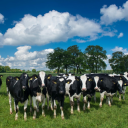
De problematiek rondom stikstof is complex en ingrijpend. Ze is diep verweven met uiteenlopende sectoren, belangen en maatschappelijke discussies. Van de veehouderij tot de industrie, van de woningbouw tot de luchtvaart: de opgave die er ligt is enorm — ook voor overheden. Tegen welke dilemma's lopen zij aan? Hoe is de onderlinge rolverdeling? En welke concrete stappen kunnen overheden zetten om zaken weer vlot te trekken? Een dubbelinterview met Deloitte’s Gijsbert Duijzer, Partner Real Estate bij Deloitte, en Mario Kortman, Director Major Programs Public Sector bij Deloitte.
Gijsbert Duijzer kent de stikstofproblematiek op het platteland van binnenuit. Hij heeft in Wageningen gestudeerd en woont op een boerderij in de Gelderse Vallei: nergens in Nederland is de stikstofopgave groter dan daar. In zijn directe omgeving ziet hij veehouders op dit moment worstelen met hun toekomst-perspectief en signaleert hij veel wantrouwen in de (rijks)overheid.
Mario Kortman heeft uitgebreide ervaring in het begeleiden van complexe en politiek gevoelige dossiers voor de rijksoverheid, onder meer voor de ministeries van Economische Zaken, Sociale Zaken en Financiën. Hij is op z'n best als gangmaker van grootschalige transformaties voor beleidsdepartementen en uitvoeringsorganisaties.
Om te beginnen, waar zit de grootste uitdaging?
Kortman: "In de kern draait het om de vraag: hoe kom je tot een gebiedsgerichte aanpak die werkt? Hoe zorg je dat rijk, provincies en gemeenten elkaar gaan vinden in het belang van de regio? En dat al die verschillende lagen van stakeholders ook echt met elkaar gaan samenwerken? Dat organiseren is bij stikstof al extreem ingewikkeld. In die dynamiek spelen ook technische aspecten een rol. Zoals met wat voor model je stikstof meet en of de uitkomst van zo’n model zwart of wit is. Als je daarover een knoop hebt doorgehakt en een fragiele balans hebt gevonden tussen alle belangen, dan moet je dat ook nog toetsen aan de menselijke maat. Met andere woorden: hoe organiseer je na al die afspraken en modellen en regels ook nog ruimte voor individueel maatwerk? Ga er maar aan staan."
Wat wordt er specifiek van de overheid verwacht?
Duijzer: "Uiteindelijk draait het allemaal om twee vragen: 'Wat wordt het beleid?' en 'Hoe gaan we het uitvoeren?'. In dit dossier hebben we het dan concreet over perspectief en duidelijkheid bieden aan de agrariërs. Als overheid zul je boeren op korte termijn helderheid moeten bieden. Alleen dan kunnen zij onderbouwd keuzes maken. En op de lange termijn zijn betrouwbaarheid en voorspelbaarheid cruciaal, maar wees ook transparant als die helderheid nog niet op alle fronten geboden kan worden."
Bij wie zou de regie moeten liggen?
Duijzer: "Rijk, provincies en gemeenten hebben allemaal een cruciale rol. De rijksoverheid zal stabiele kaders moeten bieden voor de lagere overheden, zodat zij die kunnen invullen. Maar wie gaat er formeel over de natuurvergunning? Dat is de provincie. Zij is het bevoegd gezag dat een uitspraak kan doen over het langjarige perspectief van een boerenbedrijf op een specifieke plek. En die provincies komen net uit de verkiezingen, ze hebben zojuist nieuwe gedeputeerden aangesteld. Zij zitten met veel vragen, kijken naar het rijk, naar het RIVM, naar Europa... Dat helpt niet om snel duidelijkheid te kunnen geven. Ten slotte moeten we ook de rol van de gemeenten niet vergeten, zij zijn degenen die de boeren het best kennen en vaak veel vertrouwen genieten."
Hoe staan we er momenteel voor?
Kortman: "Veel problemen in onze tijd komen neer op het anders inrichten van de balans tussen economische activiteiten en onze natuurlijke omgeving. Dat is niet eenvoudig. Hoe bescherm je het milieu en onze voedselproductie? Hoe versnel je de reductie van uitstoot, maar verlies je geen mensen onderweg? Als rijksoverheid ben je daar niet altijd op ingericht. Veel vraagstukken overstijgen individuele beleidsdepartementen, bevatten interne tegenstrijdigheden die ook in de overheid zelf tot uitdrukking komen of missen een natuurlijke regiepartner in de samenleving. En dan heeft het stikstofvraagstuk nog een eigen minister — wat voor veel andere integrale vraagstukken niet geldt."
"Wat heb je in dit dossier aan consultants die nog nooit een koe van achteren hebben gezien?"
Duijzer: "En laten we niet vergeten: de samenleving zit niet altijd te wachten op een regievoerende overheid. Op het platteland wordt toch vooral met achterdocht naar de plannen uit Den Haag gekeken. Ook niet zo gek, want boerengezinnen worden geraakt in hun bestaanszekerheid en maatschappelijk worden er heel andere verwachtingen uitgesproken richting de boeren. Daar komt nog bij dat de huidige regelingen natuurlijk open staan voor agrariërs die willen stoppen — maar er zijn er heel veel die juist dóór willen. En ook zij staan momenteel op pauze. Ze weten niet óf ze door kunnen, hoe dan en waar. En wat hun buren gaan doen... Mensen weten niet waar ze aan toe zijn."
Vraagt dat om een andere rol van de overheid?
Kortman: "Absoluut. Het rijk moet structureel met onzekerheden leren omgaan. Immers, techniek is ambigu, wetenschap geeft geen eenduidige antwoorden, de spagaat tussen collectieve en individuele belangen groeit... In de afgelopen tien jaar is besturen gewoon veel ingewikkelder geworden. En dat zal ook niet eenvoudiger worden. Daar moeten we ons op instellen. Anders communiceren, anders kijken naar het mandaat van uitvoerders, naar de samenwerking tussen departementen. Dit speelt nu op stikstof, maar eigenlijk op veel méér terreinen, alleen al als gevolg van klimaatverandering."
Duijzer: "Tegelijk moeten we wel, overal waar het kan, die complexiteit zien te reduceren. Anders kom je eenvoudigweg niet uit de startblokken. Op een gegeven moment moet je zeggen: op de plekken waar we kúnnen beginnen met een gebiedsgerichte aanpak, gaan we ook starten. Dat vraagt om bestuurlijk lef: starten met de uitvoering terwijl er nog vragen open staan."
Misschien een gekke vraag, maar wat werkt níet?
Kortman: "We maken het onszelf vreselijk lastig als we met z'n allen blijven zoeken naar die silver bullet, naar die technische uitweg. Vastklampen aan technologische oplossingen is niet de oplossing. En als we ons vastleggen in complexe akkoorden waardoor er geen flexibiliteit meer is: dat werkt ook niet. Het leidt af én het heeft veel ongewenste neveneffecten. Want iedereen die net iets buiten de norm valt, belandt buiten de regeling — terwijl er maar een fractie verschil is met de buren. We moeten realistisch zijn en beseffen dat kleine stapjes voorwaarts soms het maximaal haalbare is."
Duijzer: "En wees daar ook eerlijk over. Veel zekerheden uit het verleden zijn er vandaag niet meer. Neem bijvoorbeeld de bank. Die financierde boeren altijd op basis van twee zekerheden, naast het onderpand: de vergunning en goedgekeurde technologie. Beide staan nu ter discussie. En dat zou best wel eens blijvend kunnen zijn. Alles kan veranderen. En dat geldt voor de overheid net zo. Als provincies nu op zoek gaan naar garanties voor boeren over vijftien jaar, dan gaan ze die niet vinden. We moeten niet vergeten: op dit moment staat de veehouderij praktisch stil. Bij de bank komen vrijwel geen nieuwe financieringsaanvragen meer binnen. Je moet als overheid durven zeggen dat je die duidelijkheid wél kunt geven voor de komende jaren en een richting voor de langere termijn, maar geen zekerheid voor de komende decennia."
En wat werkt wél?
Duijzer: "Momenteel maken we als onderdeel van onze opdracht van het ministerie van LNV een rondgang langs provincies, gemeenten, de georganiseerde landbouw en andere betrokken partijen om de huidige situatie in kaart te brengen. Onze inzet is: laat je niet verlammen door complexiteit. Er zijn voldoende punten waar je wel degelijk duidelijkheid kunt geven en waar je nu al concrete stappen kunt zetten. Ook als die boodschap niet leuk is. Er zijn nu eenmaal plekken waarvan je al weet: op deze locatie kan ik een boer wél perspectief bieden — maar op die andere plek is dat perspectief er gewoon niet. Begin op die punten met het verschaffen van duidelijkheid."
"Stel je als overheid kwetsbaar op, je hoeft niet alles te weten, maar je moet wel in beweging komen."
Kortman: "Precies. Begin klein waar het kan. Durf te starten zonder dat alle problemen al helemaal opgelost zijn. Ga een constructieve dialoog aan, met belangengroepen, banken en boeren, maar mobiliseer ook alle lagen van de overheid. Stel je als regievoerder kwetsbaar op, je hoeft niet alles te weten, maar je moet wel in beweging komen."
Tot slot: zijn er nog do's en don'ts die het stikstofvraagstuk meer lucht kunnen geven?
Kortman: "Een dichtgetimmerd landbouwakkoord of een technische eindwaarde die alles oplost? Dat gaat niet de oplossing bieden in dit dossier. De onzekerheid en complexiteit zijn daar eenvoudigweg te groot voor. Alleen door transparant te zijn over onzekerheden kun je de stikstofproblematiek verteerbaar en hanteerbaar maken. En als je ondersteuning zoekt van consultants, eis dan dat zij niet de materie platslaan in een kortetermijnoplossing — maar duurzaam begrip hebben van jouw uitdaging. Dat ze de strategische problemen snappen én dat ze met praktische, haalbare oplossingen komen."
Duijzer: "Bij Deloitte werken we vanuit begrip van de situatie, de problematiek en de context, zowel op inhoud en techniek als op de dynamiek in het stakeholderveld. Mooi voorbeeld in dit verband: we hebben voor het ministerie van LNV en de provincies de zaakbegeleiders geworven om met de boeren in gesprek te gaan, om samen op zoek te gaan naar een werkbare oplossing. We snappen welk profiel daarvoor nodig is en weten de juiste mensen te vinden. Verder voeren wij verkenningen uit bij alle betrokken partijen. Wat is er nodig om boeren perspectief te bieden? En wat is er minimaal vereist om te kunnen starten met een oplossing? We zijn vooral een verbinder die kan helpen om verbeteringen daadwerkelijk te realiseren en in te richten. Maar daarvoor moet je dus wel die brug kunnen slaan. Want wat heb je in dit dossier aan een consultant die nog nooit een koe van achteren heeft gezien?"
Vote your favourite innovative idea to the AmSIA stage!
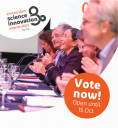
Which innovative idea will make it to the stage during the finale of the Amsterdam Science & Innovation Award 2023? This Innovation Award is the Amsterdam competition for research based innovative ideas that contribute to a better world. Check out the website and watch the pre-finalists one-minute videos in which they present their innovative ideas and vote for your favorite! During the finale on 21 November, the jury will award € 10,000 to the three best ideas in the categories of Society, Health and Environment & Climate.
SAVE THE DATE | 10 Okt. - Kans voor ondernemers met duurzame oplossingen

Ben je een ondernemer met een duurzaam product of dienst en wil je écht impact maken? Kom dan naar het matchmaking evenement voor het unieke aanbestedingstraject Scale Up Toekomstbestendige kunstgrasvelden van de Gemeente Amsterdam en Haarlem. Elke ondernemer, die bij kan dragen aan innovatieve en duurzame toepassingen op en onder kunstgrasvelden, is welkom!
Datum: dinsdag 10 oktober 2023
Tijd: 13.30 – 18.00
Locatie: Johan Cruijff ArenA
Aanmelden
Meld je hier alvast aan als deelnemer van het evenement. Het definitieve programma volgt.
Tijdens dit evenement:
- Maak je kennis met het project Scale Up Toekomstbestendige kunstgrasvelden;
- Kom je erachter hoe ook jouw bedrijf hieraan kan bijdragen;
- Ontmoet je andere ondernemers met dezelfde visie;
- Word je geïnspireerd en uitgedaagd om out-of-the-box te denken;
- Vind je de perfecte match om later mee te doen aan de aanbesteding.
Meer informatie
Voor dit evenement zoeken we expliciet bedrijven uit diverse branches, die samen willen werken om het sportveld van de toekomst te ontwikkelen. Kijk hier voor meer informatie over dit project.
Disclaimer: Het is niet verplicht om deel te nemen aan het matchmaking event om mee te kunnen doen met de aanbesteding.
Met vriendelijke groet,
Team Scale Up Toekomstbestendige kunstgrasvelden
Statiegeld op kleding: Modemerk New Optimist luidt een mode-industrie in zonder afval.

Amsterdam, 10 augustus - Op woensdag 13 september is het zo ver: met de oprichting van stichting N.E.W. (Never Ever Waste) zet New Optimist de revolutionaire stap naar statiegeld op kleding. Het statiegeldsysteem maakt 100% circulariteit mogelijk en geeft de consument de touwtjes in handen om te zorgen dat zijn of haar favoriete kledingstuk uiteindelijk weer onderdeel wordt van de mode-circle of life. New Optimist maakt het systeem toegankelijk voor andere modemerken in de nabije toekomst. Kleding hoeft nooit meer te eindigen als afval.
In de afgelopen 20 jaar verdrievoudigde de hoeveelheid afgedankte kleding in Europa van 550 duizend ton naar bijna 1,7 miljoen ton textiel, presenteert het rapport a EU-milieua-gentschap EEA begin 2023. Wat blijkt? 87% van dit afgedankte textiel, wordt vandaag de dag nog steeds geëxporteerd naar Azië en Afrika. Het merendeel belandt op stortplaatsen of informele afvalstromen.
Uit recent onderzoek verricht door Changing Marketing Foundation, wordt geconcludeerd dat Greenwashing nog altijd rijkelijk aanwezig is. Kledingstukken die netjes door de consument werden ingeleverd voor recycling bij verschillende merken, werden middels geplaatste Apple Airtags gevolgd. Het blijkt dat driekwart werd verbrand, opgeslagen in magazijnen of verscheept naar arme landen.
Volgens de uitgebreide producentenverantwoordelijkheid (UPV) voor textiel zijn kledingproducenten in Nederland vanaf 1 juli 2023 verantwoordelijk voor de textielproducten wanneer zij afval zijn geworden en moeten het afvalbeheer van deze producten organiseren. EU-milieu-agentschap EEA noemt de verschuiving van inzamelingsverantwoordelijkheid een risico. Door onverantwoorde inzamelprocessen in een aanzienlijk deel van de mode-industrie,
kan het exportvolume van afgedankte kleding alleen maar verder toenemen.
Stichting N.E.W. (Never Ever Waste)
Stichting N.E.W. is een initiatief van New Optimist, welke de statiegeld gelden beheert voor alle kledingmerken die deelnemen aan dit statiegeldsysteem. New Optimist roept andere duurzame kledingmerken op zich aan te sluiten bij Stichting N.E.W., en statiegeld in te zetten om kleding die ze op de markt brengen circulair te maken.
Om de steeds maar groeiende textiel afvalberg tegen te gaan, introduceert New Optimist Stichting N.E.W. (Never Ever Waste): het eerste statiegeld platform voor kleding. Dit nieuwe systeem garandeert dat jouw kleding wordt gerecycled en dat je het hele proces tot aan recycling kan volgen. Met een kledingstuk met statiegeld maak je de mode cirkel 100% circulair en laat je aan iedereen zien dat kleding niet als afval hoeft te eindigen.
Candour.Digital
New Optimist, pionier in het veranderen van de mode-industrie, heeft dit digitale statiegeldsysteem ontwikkeld, in samenwerking met Cadour.Digital voor Stichting N.E.W.
Candour.Digital is een IT-startup die zich richt op digitale product paspoorten. Door slim gebruik van QR-codes en blockchain technologie, kunnen individuele kleding stukken in de hele levensloop gevolgd worden.
Geen circulariteit zonder jou!
Hoe werkt het statiegeldsysteem?
1. Productaanschaf
Bij aankoop van een New Optimist kledingstuk met statiegeld wordt er een klein bedrag extra berekend. Het statiegeld varieert tussen de €2.5 en €10, afhankelijk van de prijs van het kledingstuk. Op de hangtag van het kledingstuk is zichtbaar hoeveel statiegeld op het kledingstuk zit. Je kan dit ook zien door het QR label te scannen
2. Items retourneren
Wanneer het artikel niet meer gedragen wordt,
kan het kledingstuk worden ingeleverd om het een tweede leven te geven. Dit kan bij aangesloten winkels of met een retour procedure via New Optimist.
3. Een nieuw leven
Het maakt niet uit in welke staat het item is. New Optimist bekijkt of het nog tweedehands verkocht kan worden (ook dat kan gevolgd worden via de QR-code), maar uiteindelijk wordt de kleding vervezeld en verwerkt tot nieuwe garen. Niks gaat verloren. 100% circulair!
Via de QR-code kan circulaire route van elk kledingstuk worden gevolgd.
YES statiegeld. NO textile waste!
New Optimist
Voor New Optimist is circulariteit, naast lokaal en sociaal ondernemerschap, al vanaf de oprichting in 2020 bepalend. De mode van New Optimist is ontworpen voor circulariteit:
het merk zorgt ervoor dat elk kledingstuk voor 100 procent gerecycled kan worden. Om mode echt 100% circulair te maken, introduceert New Optimist het eerste statiegeld platform voor kleding. Dit nieuwe systeem, dat ontwikkeld is samen met Candour.Digital, garandeert dat jouw kleding wordt gerecycled en dat je het hele proces tot aan recycling kan volgen.
Meer informatie:
Xander Slager, +31 6 29082052, xander@newoptimist.nl
Nelleke Wegdam, +31 6 12261779, nelleke@newoptimist.nl
Demoday #20: Plastic, we love it!
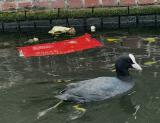
Ons plasticverbruik stijgt nog steeds drastisch
Technisch gezien zijn alle oplossingen voorhanden om ons plasticgebruik drastisch te verminderen in zowel productieprocessen en het voorkomen en/of verwijderen van microplastics in de natuur. Toch verandert er in de praktijk bijna niets. Er zijn veel initiatieven, maar de vraag is of die een daadwerkelijk verschil maken, want als we naar de cijfers kijken stijgt ons plasticgebruik nog steeds drastisch. Sinds 2000 is ons plasticverbruik zelfs verdubbeld!
Waarom verandert er zo weinig?
Hoe kan het dat we, ondanks dat we weten hoe slecht het is voor onszelf en het milieu, er niets significant veranderen aan ons plasticgebruik? En wat kunnen we doen om het plasticprobleem nu wél echt aan te pakken in de regio? Deze vragen stonden centraal tijdens de werksessie ‘Plastic, we love it.’ Tijdens de werksessie hebben de aanwezige strategische denkkracht gemobiliseerd om samen tot nieuwe inzichten komen in de keten van plasticgebruik én nieuwe oplossingsrichtingen met elkaar te bedenken.
Gek, gekker, goed!
Als we doorgaan zoals we nu doen, gaat het dus niet lukken. Daar zijn we het met elkaar over eens. Maar hoe dan wel? Om dat met elkaar helder te krijgen, hebben we eerst een aantal echt onrealistische en misschien zelfs wel onethische oplossingen bedacht. En dat hebben we geweten. Van ‘geen kinderen meer krijgen’ tot aan ‘recyclepolitie op de hoek van elke straat’ en het ‘verbieden van alle plastics’ werden geopperd. En probeerden we zelfs daar nog een schepje bovenop te doen. Natuurlijk niet om uit te voeren, maar wel om daarna weer te kunnen komen tot goede ideeën. We hielpen elkaar en werkten elkaars ideeën en oplossingsrichtingen uit tot realistische en goede ideeën.
Waar ligt jouw invloed?
Maar ideeën bedenken is makkelijk, maar de werkelijke uitdaging ligt bij het komen van idee naar plan naar uitvoering. Dus wat je kun zelf doen? Hoe kan ík een werkelijke bijdrage leveren aan het oplossen van dit complexe vraagstuk? Samen met de groep hebben we gekeken naar daar waar onze eigen invloed zit. De groep kwam met mooie concrete ideeën waar we zelf aan mee kunnen werken en aan kunnen jagen. In de top 3 stonden een bewustwordingscampagne, een plastic politie, lobby richting de politiek door bovenregionaal samen te werken en het belonen van goed gedrag. We kijken terug op een mooie werksessie met waardevolle uitkomsten en kijken uit naar het vervolg en natuurlijk vooral naar een echt resultaat: geen plastic meer in de natuur en in ons voedsel.
Marten Boels, dank voor het inbrengen van dit relevante en belangrijke onderwerp!
The new circular e-bike for Life

In Nederland worden jaarlijks een miljoen fietsen afval. Wij zijn van mening dat geen enkele fiets ontworpen mag zijn om na gebruik op de vuilnisbelt te belanden. We willen bewijzen dat het mogelijk is om de schade aan onze planeet te minimaliseren en tegelijkertijd de beste ervaring voor onze rijders te bieden.
De e-bike die is ontworpen om een leven lang mee te gaan. Opgebouwd uit hoogwaardige modules, (her)configureerbaar naar jouw wensen. Continu gemonitord, met service aan huis. Binnen een dag. Alles om een zorgeloze rit te garanderen, voor het leven.
Doe je mee?
Donderdagavond in De Studio van NEMO
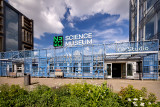
Om de week op donderdagavond organiseert NEMO een extra activiteit in De Studio. Speciaal voor volwassenen. De workshops, lezingen en dialogen gaan over energie en klimaat en sluiten aan bij het thema van de tentoonstelling Energy Junkies. Voorafgaand aan de activiteiten kun je de tentoonstelling bezoeken.
Activiteiten
2 februari 2023 - Theater - SNIKHEET
Theatergroep Parels voor de Zwijnen komt naar De Studio van NEMO. Met een voorstelling over een ‘hot’ item: we moeten met zijn allen als de sodemieter van het gas af. Maar de energietransitie verdeelt Amsterdamse bewoners.. Lees meer.
16 februari 2023 - Futures Literacy workshop - Dé toekomst bestaat niet!
Nadenken over de toekomst beïnvloedt de beslissingen die we nu maken. En als we het hebben over klimaatverandering, denken we vaak aan de toekomst. Daarom is het de hoogste tijd om eens onder de loep te nemen op wat voor manieren we een toekomstbeeld kunnen creëren en wat daarbij de valkuilen zijn. Wil jij ook leren om opener over de toekomst na te denken? Lees meer.
2 maart 2023 - Dialoog/game - Climate Privilege Walk
In de Climate Privilege Walk ontdek je hoe het is om in de schoenen van een ander te staan. Op basis van jouw persoonlijke situatie beantwoord je verschillende vragen over energie en klimaat. Aan het eind van de Climate Privilege Walk wordt door de afstand tussen de deelnemers duidelijk hoe groot de ongelijkheid is. Lees meer.
16 maart 2023 - Lezing - Eerste hulp bij energie besparen
Is jouw energierekening ook zo hoog en ben je benieuwd naar hoe je jouw verbruik kan verminderen? In deze lezing vertelt Elisah Pals, oprichter van Zero Waste Nederland, hoe je het klimaat én je portemonnee een handje helpt door te leven zonder afval. Pals geeft je tips en tricks hoe je je ecologische voetafdruk verkleint, minder CO2 uitstoot, meer zelf maakt en minder weggooit. Goed voor het klimaat én je portemonnee. Daarnaast vertelt ze over het ontstaan van Zero Waste Nederland en hoe zij zelf al 5 jaar lang geen nieuwe spullen kocht. Lees meer.
30 maart 2023 - Bordspel - The Change Game
Tijdens The Change Game onderzoeken we in samenwerking met Danielle Arets en Jessie Harms hoe we onze omgeving duurzamer, veiliger en groener maken. Hoe kunnen we onze dorpen, steden en gemeenschappen aanpassen aan hetveranderende klimaat. Het spel onderzoekt welke mogelijkheden erzijn om leefomgevingen klimaat adaptief te maken en welke thema’s hierbij belangrijk zijn. Lees meer.
13 april 2023 - Lezing - Kernenergie: kans of bedreiging?
Hoe zorgen we voor voldoende energie én bestrijden we de gevolgen van klimaatverandering? Hoewel het aandeel van duurzame energie stijgt, wordt het grootste deel van de Nederlandse elektriciteit nog altijd uit fossiele brandstoffen gewonnen. Kan kernenergie een oplossing bieden voor een CO2-neutrale samenleving? De meningen over dit controversiële onderwerp lopen flink uiteen.
In deze lezing vertelt Behnam Taebi (professor Energie & Klimaatethiek TU Delft) over de wortels van de technologie in de militaire toepassing, over het risico op ongelukken en over de impact van radioactief afval. Lees meer.
Tickets
Voor een bezoek aan een activiteit op donderdagavond reserveer je een apart ticket. De toegangsprijs is: € 7,50. Het programma is inclusief een bezoek aan de tentoonstelling Energy Junkies. Reserveer hier je ticket.
Locatie en tijd
De activiteiten starten om 20.00 uur. Voorafgaand kun je vanaf 19.00 uur de tentoonstelling Energy Junkies bezoeken.
Adres: Kattenburgerstraat 5, gebouw 027A in Amsterdam. Volg de bordjes vanaf de hoofdingang aan de Kattenburgerstraat.
Foto: DigiDaan
Zo maken we de kledingindustrie duurzamer
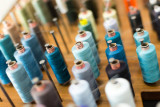
De kledingindustrie is één van de meest vervuilende industrieën op aarde. Het grootste probleem is dat er simpelweg te veel kleding geproduceerd wordt. Hierdoor wordt niet alles gedragen en dragen mensen hun kleding vaak maar een relatief korte tijd. Om kleding een langer leven te geven, is het United Repair Centre (URC) opgericht. Hoe werkt het URC? En wat gaat dit opleveren?
In de podcastserie BoardCast praten we met koplopers uit ons netwerk over de belangrijkste thema’s die de Amsterdamse Metropool bezighouden. Deze aflevering van BoardCast gaan we in op de vraag: Hoe maken we de kledingindustrie duurzamer?
Podcasthost Eline Ronner gaat op zoek naar antwoorden met:
- Thami Schweichler, CEO United Repair Centre en mede-oprichter van Makers Unite
- Willem Swager, Director Finance & Operations EMEA bij Patagonia
- Claire Teurlings, Lead Circulaire Economie bij Amsterdam Economic Board
Meer weten?
We praten onder meer over het United Repair Centre en de activiteiten die Patagonia onderneemt om de kledingindustrie te verduurzamen. Lees ook over hoe Amsterdam Economic Board heeft meegewerkt aan de totstandkoming van het United Repair Centre.
Beluister meer
Beluister ook onze podcast voor innovatieve ideeën en oplossingen over slimmer investeren in talent en lees meer over wat je van deze aflevering kunt verwachten.
Bio-based renovation
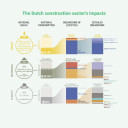
The primary reason to renovate buildings is to improve indoor climate quality and reduce environmental impact. This can be extremely effective, as 75% of buildings' CO2 emissions are released during the use phase. However, using non-renewable materials during renovation can be entirely counter-productive.
Check out this article to learn about bio-based materials in the renovation, and the obstacles to bio-based innovation.
Recap of Demo Days #16 – Circular meets Digital
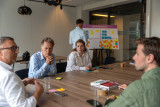
For the sixteenth edition of our Demo Days, we were finally able to meet offline again since the start of the pandemic. This meant: old-school post-its instead of filling online Miro boards. The Circular & Digital Demo Day was hosted at one of our partners’ locations, the Digital Society School at the Amsterdam University of Applied Sciences. From reducing illegal drones in the city to reusing materials through a digital material database, in this article you’ll read all about circular & digital projects our partners are working on.
About our Demo Days
The Demo Days are one of the tools we use to stimulate innovation and encourage connection between our partners and community. The purpose of the Demo Days is to present the progress of various innovation projects, ask for help, share dilemmas and involve more partners to take these projects to the next level. More information about the Demo Days can be found here.
Demo Day: Circular & Digital
Reducing (illegal) drones in the city - Daan Groenink (municipality of Amsterdam)
In Amsterdam, and in many other places in the Netherlands, is not allowed to fly drones. But despite the regulations, many drones are still flown illegally over Amsterdam. Daan Groenink from the municipality of Amsterdam invited the participants to reflect on how the city of Amsterdam can reduce (illegal) drone usage with as little enforcement as possible. Many creative interventions were discussed, such as awareness campaigns, making beautiful drone images public, and renting out drones as an experience.
Subsidy scheme for circular chain cooperation - Suzanne van den Noort en Maartje Molenaar (province of Noord-Holland)
The province of North Holland wants to be 100% circular by 2050. To achieve this, an action agenda has been drawn up for 2021-2025 with strategic and operational goals. The province of North Holland initiated the ‘Circular Economy Subsidy Scheme’ to accelerate the circular transition. The province of North Holland already thought about how this subsidy scheme should work. In this session, the participants gave their feedback. One of the key take outs from the working session was: keep it simple. You want to know that the money is well spent and therefore the conditions of the subsidy scheme should be clear.
Digital material database – Mark van der Putten (municipality of Amsterdam)
The City of Amsterdam is developing a digital material database for the necessary exchange of information to enable the reuse of materials from projects. Projects can use this database to report their available materials or to reserve materials. In this way, a street can be paved with tiles from an old project. The municipality of Amsterdam asked for input from the Amsterdam Smart City network on what to keep in mind while developing a digital material database. During the session, the participants discussed topics such as data governance, data ownership and the advantages of a SAAS solution compared to a self-built database. The municipality of Amsterdam will continue to research how the material database could be used and what the stakeholders think of it during 6 pilot projects.
Want to join the next Demo Day?
Are you working on an innovative project that could use some input? Or are you preparing for an inspiring event that needs a spotlight? Our next Demo Day takes place on the 11th of October. If it fits within our themes (circular, mobility, energy and digital), sent a message to Sophie via sophie@amsterdamsmartcity.com or let us know in the comments. We are happy to talk with you to find out if it's a match!
Would you like to participate in the next Demo Day and share your thoughts on our partners’ innovative projects? As soon as the program for the next Demo Day is determined, we will share it on the platform and give you the opportunity to join as participant.
Curious to mobility & energy projects? Read more about it in the recap of Demo Day Mobility & Energy.
Photo: Myrthe Polman
The Circularity Gap Report for the Built Environment
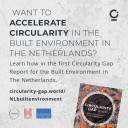
The first Circularity Gap Report for the Built Environment in The Netherlands has launched!
The Netherlands has set an ambitious goal: a circular building sector by 2050. However, the built environment in the Netherlands is a massive motor for downcycling. Only 8% of the total material consumption comes from secondary materials.
This report by Metabolic, C-creators, Goldschmeding Foundation and Circle Economy shows new insights and specific actions for businesses, policymakers, urban planners and labour unions to accelerate circularity in the sector.
Get the overview from the summary in Dutch or download the full report in English below.
Industrial Symbiosis
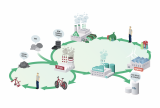
At the end of its production process, waste or “output” produced by one company can be reborn into a valuable raw material or “input” for another.
This process is called “Industrial symbiosis”.
Learn more about it in the link below.
Afval naar Oogst trekt de stad door!
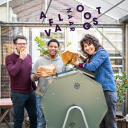
Niet langer hoef je jouw groente- en fruitafval weg te gooien, want samen maken we er lokaal waardevolle compost van, met Afval naar Oogst! Op 5 verschillende locaties in de stad kun je je nu aanmelden om GF-afval in te leveren. Op 23 april tijdens de kick-off leer je alle ins & outs. Zo maken we samen de cirkel rond. Composteer je mee?
Afval naar Oogst is ontsproten op buurttuin 'I can change the world with my two hands' waar nu meer dan 100 huishoudens hun GF-afval inleveren, dat wordt omgezet tot goede compost, voor nog betere oogst in de tuin! Het is de ambitie nog veel meer plekken te creëren voor lokale inzameling van groente- en fruitafval.
De duurzame toekomst van Amsterdams afvalwater
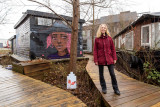
Als je de wc doortrekt, denk je waarschijnlijk niet na over wat er met het water gebeurt. Maar hier gaat een hele wereld achter schuil! En er wordt hard aan gewerkt, om die verborgen waterwereld duurzamer te maken. Als innovatietechnoloog bij Waternet houdt Enna zich bezig met het ontwikkelen van slimme afvalwatersystemen, en wij van De Gezonde Stad interviewden haar.
Wat is jouw droom voor Amsterdam?
“Dat water voor Amsterdammers meer waarde heeft. Dat we het meer respecteren. Nu is het zo vanzelfsprekend dat er water uit de kraan komt, zoveel en wanneer we maar willen. En we gaan naar het toilet, of onder de douche, of zetten de afwasmachine aan, en voor de bewoners is het water weg. Het zou fijn zijn als de hele cyclus meer circulair is. Dat afvalwater niet langer iets is wat vies is, maar dat we het gaan zien als een grondstof die we graag willen hergebruiken. Wat nou als je bij de bouwmarkt een toilet kan kopen die jouw urine apart houdt en daar meststof uithaalt die je zelf in je tuin kan gebruiken of af kan geven alsof het een statiegeldsysteem is. Dan krijgt het zoveel meer waarde.”
Lees op onze website het hele interview en leer de verborgen waterwereld kennen!
The interconnected city: Imagining our urban lives in 2050

Our cities are evolving. Fast. How can we ensure they are sustainable, liveable, and healthy?
Metabolic has developed a nature-inclusive, community-centered, and circular city's vision.
This vision of the "ideal" city is only one of many. What's your favorite? Please share the story, vision, book, podcast, or image that best represents the city you hope to live in, one day.
Meet the members of Amsterdam Smart City! Boaz Bar-Adon: ‘Learn children about the circular economy’
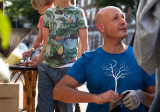
Boaz Bar-Adon is the founder of Ecodam, a startup that wants to create a place where children can actively learn about sustainability and the circular economy.
“Our big dream is a physical place where children can come to get acquainted with all aspects of sustainability—a kind of science museum, but with more focus on the concept of circularity and the role young people can play in the new economy.
It’s almost a cliche, but our children are the future. If we make them realise that we need to use resources in a different way, they will take that with them for the rest of their adult lives — no matter what profession they enter later. As a museum and exhibition designer, I see there is too little awareness among clients, designers and builders about the scarcity of materials. That should really change for future generations.''
''Recently, my associate, Pieter de Stefano, and I decided that we want to start making an impact as soon as possible. We designed a plastic-themed mobile pop-up lab. We recently gave our first successful workshop, and we plan to do it more often. In our school workshops, we give a brief explanation about circularity and the impact we have on the environment. But the most important part is when the children work on the concept of circularity. Together, we invent solutions and build prototypes. We let the children think about the problem and then let them come up with solutions themselves.”
Unstoppable
“Once it got going, the group we gave the workshop to was unstoppable. A few girls designed an entire landscape from old waste, which was a prototype of an environment where children do not throw away their old toys but collect them. Another group built a submarine to remove plastic from the sea, inspired by the Dutch nonprofit The Ocean Cleanup. The workshop ended with children creating, with specialised machines, new products from plastic waste. In the future, Ecodam could be a place where schools and universities test or show new materials or techniques. Local authorities that want to promote new policies around waste or the circular economy can also work with us. In Ecodam, they can see how children react to their policies. Maybe they will come up with new ideas.''
Permanent space
''We would like a permanent space so we can work with large machines: a shredder, for example, that cuts plastic parts into small pieces or a machine that melts them and can then press the liquid plastic into a mould. Children can create new building materials with these machines, making technology something very tangible and rewarding.
I'd love to hear of any tips people may have for a permanent space. We are a social enterprise, still investigating which business model works best for us. We will probably be partly supported by subsidies, but we are also looking for fresh ideas for smart new financing methods. How can social value be translated into financial value? Our final goal is being able to facilitate as many visitors as possible and provide them with a meaningful and high-quality experience.”
If you’d like to get in touch with Boaz, you can find him on this platform.
This interview is part of the series 'Meet the Members of Amsterdam Smart City'. In the next weeks we will introduce more members of this community to you. Would you like show up in the series? Drop us a message!
Interview and article by Mirjam Streefkerk
Stay up to date
Get notified about new updates, opportunities or events that match your interests.

